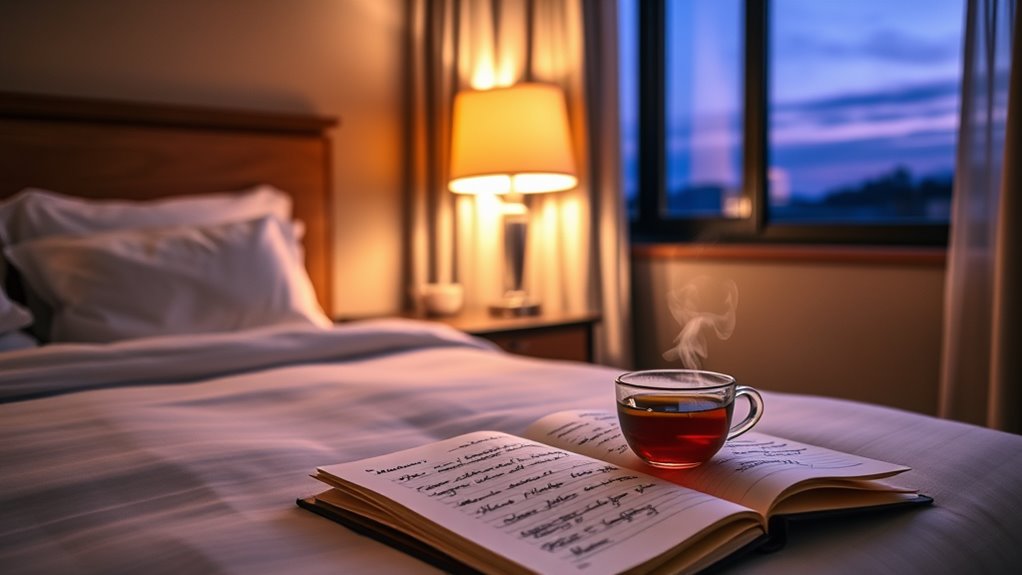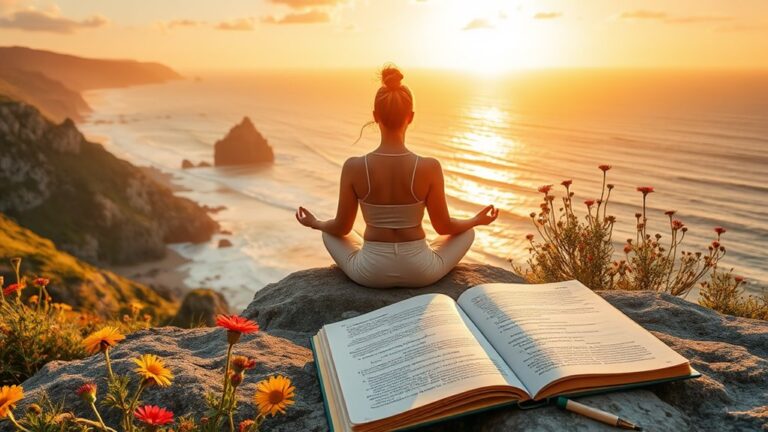To calm your mind before bed while traveling, start with a soothing pre-bedtime routine. Dim the lights and sip on warm herbal tea, and consider using calming essential oils like lavender. Limit screen time an hour before sleep to maintain a natural rhythm. Create a comfortable sleep environment by packing your favorite pillow and blanket. Incorporate mindfulness techniques like deep breathing and journaling to release thoughts. There's more to discover on enhancing your travel sleep experience.
Nomad Highlights
- Establish a relaxing pre-bedtime routine with dim lighting, a good book, or warm herbal tea to signal your body to wind down.
- Engage in mindfulness and meditation practices, focusing on breathwork techniques to center your mind and promote relaxation.
- Create a comfortable sleep environment by packing a travel pillow, soft blanket, and maintaining a cool, well-ventilated area.
- Utilize relaxation techniques like deep breathing or progressive muscle relaxation to release tension and quiet racing thoughts.
- Journal to clear your mind of thoughts and worries, creating a calming ritual before bedtime to enhance creativity and reduce stress.
Establish a Relaxing Pre-Bedtime Routine
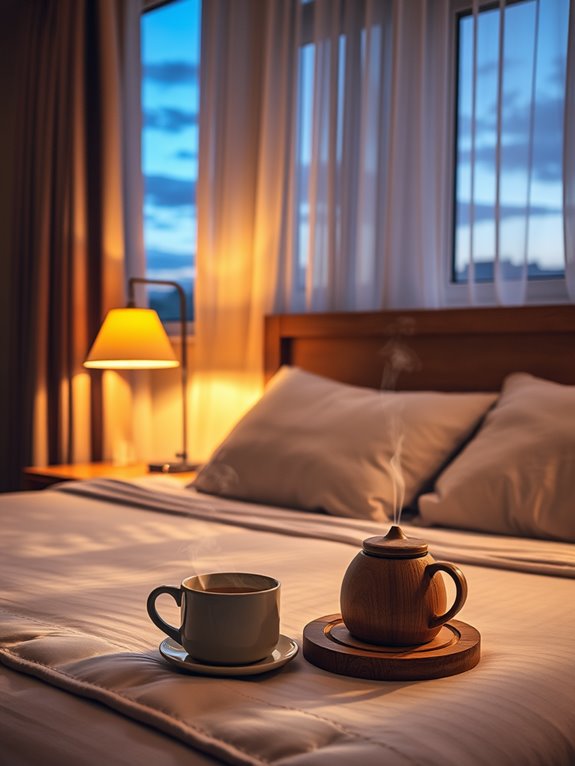
Creating a relaxing pre-bedtime routine is essential if you want to calm your mind and prepare for a restful night's sleep.
Start by establishing bedtime rituals that signal your body it's time to wind down. Consider dimming the lights, reading a book, or enjoying a warm herbal tea. These practices enhance your sleep hygiene, making it easier to shift into slumber. Incorporating calming essential oils into your routine, like diffusing a blend designed for tranquility, can further enhance your winding down process. Essential oils like chamomile and lavender can promote relaxation and improve sleep quality. Using a portable essential oil diffuser can make it easy to enjoy these calming scents wherever you are.
Avoid screens an hour before bed, as blue light disrupts your natural rhythm. Instead, focus on soothing activities that promote relaxation. You might even try gentle stretching or journaling to clear your thoughts. Incorporating techniques for effective light blocking can further enhance your sleep quality while traveling.
Practice Mindfulness and Meditation
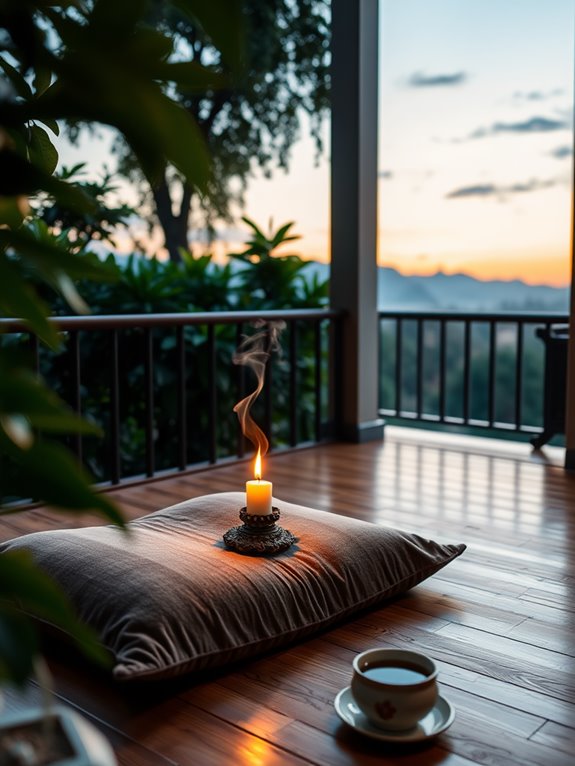
As you settle into your pre-bedtime routine, practicing mindfulness and meditation can greatly calm your racing thoughts and promote relaxation.
Start by focusing on mindful breathing; inhale deeply through your nose, hold for a moment, and exhale slowly through your mouth. This simple technique helps center your mind and body, making it easier to drift into sleep. Engaging in breathwork techniques can enhance your relaxation experience and provide a deeper sense of peace. Journals that include structured guidance can be useful tools in this process, helping you track your progress and promote consistency in your practice. Regular practice of these techniques can reinforce stress reduction, leading to improved sleep quality over time. Additionally, incorporating guided meditation scripts can provide you with a variety of approaches tailored to your specific relaxation needs.
Consider using meditation apps that offer guided sessions tailored for sleep, allowing you to explore various techniques, from body scans to visualization. Experiment with different durations to find what resonates with you. Additionally, you might find it beneficial to listen to guided meditation CDs that specifically target relaxation and sleep.
Integrating these practices into your nightly routine not only enhances tranquility but also fosters a deeper connection with your thoughts, paving the way for restorative sleep during your travels.
Limit Screen Time Before Sleep
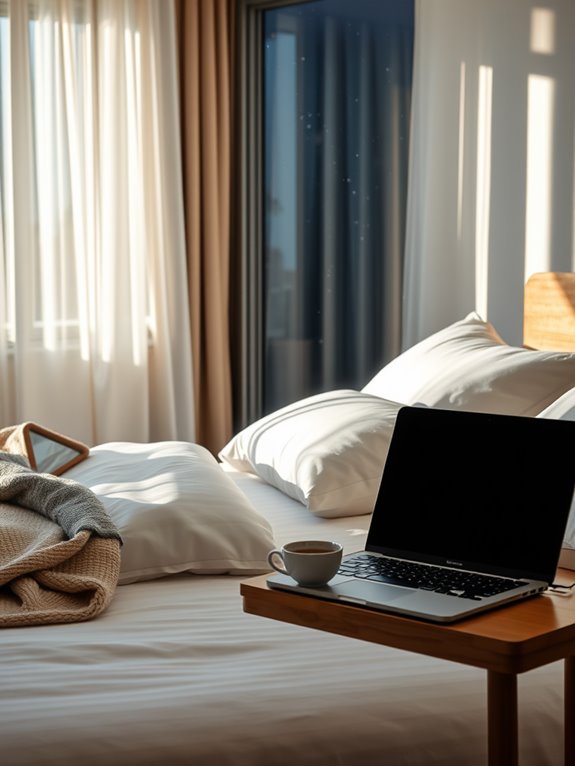
Mindfulness and meditation set a calming tone for your evening, but limiting screen time can greatly enhance your wind-down routine.
By opting for a digital detox, you allow your mind to shift from the day's stimuli to a more peaceful state. Try to unplug from devices at least an hour before bed; this simple action can considerably improve your sleep quality. Engaging in activities such as coloring can also promote relaxation, as coloring promotes relaxation and mindfulness, allowing your mind to unwind naturally. Using aromatherapy inhalers during this time can further enhance your relaxation experience. Additionally, incorporating stress relief coloring books into your evening routine can provide a creative outlet that eases tension and encourages mindfulness. Regular practice can lead to a more profound understanding of your body's responses through biofeedback devices, which can enhance your overall relaxation experience. Moreover, incorporating breathwork techniques can help activate the body's relaxation response, further promoting a serene atmosphere.
Opt for a digital detox an hour before bed to enhance your sleep quality and embrace a more peaceful state of mind.
Instead of scrolling through your phone, engage in evening rituals that promote relaxation, like reading a book or journaling. These activities foster a serene atmosphere, enabling your mind to unwind naturally.
Embrace this shift in your routine, and you'll find that a screen-free evening can lead to deeper, more restorative sleep while traveling.
Create a Comfortable Sleep Environment
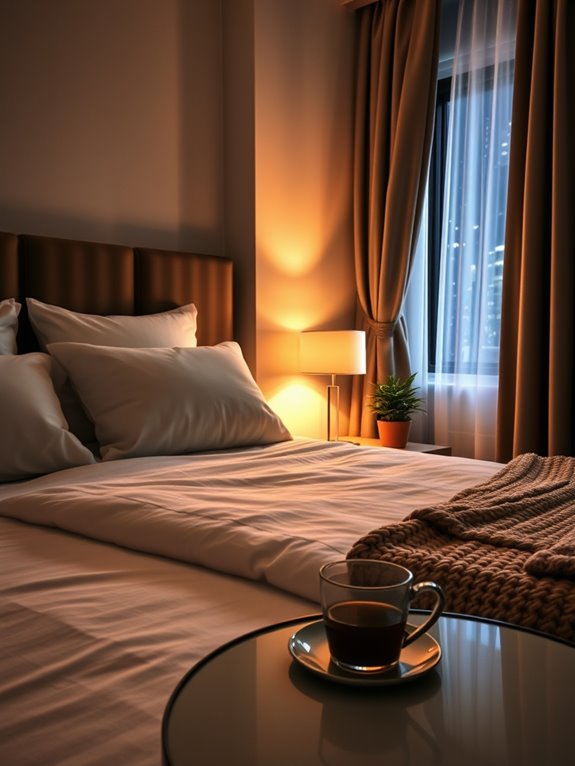
Here are three sleep essentials for your journey:
- Bedding Comfort: Consider packing a travel pillow and soft blanket to guarantee you're cozy, no matter where you rest. A quality memory foam travel pillow can provide exceptional support for your neck and shoulders, enhancing your overall comfort during travel. Additionally, using cooling pillowcases can help regulate your sleep temperature, ensuring a more refreshing slumber. Incorporating sleep aromatherapy sprays can further enhance relaxation and improve the quality of your sleep while away from home.
- Ambient Lighting: Use a small, adjustable lamp or soft nightlight. This way, you can control the brightness and create a soothing atmosphere to help you unwind.
- Temperature Control: Keep your sleeping area cool and well-ventilated. If you can, adjust the thermostat or open a window to maintain a comfortable climate. Additionally, bringing along a portable humidifier can help enhance air quality and ensure a refreshing atmosphere for better sleep.
Use Relaxation Techniques and Breathing Exercises
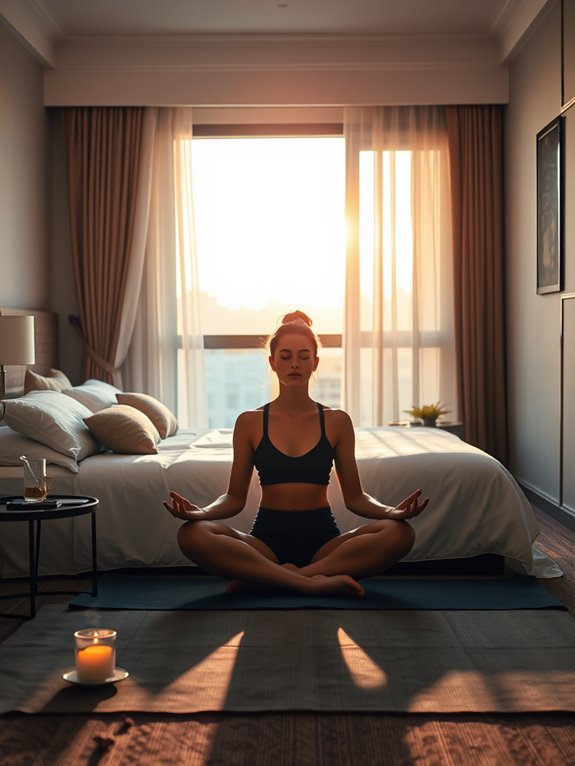
To ease your mind before sleep, incorporating relaxation techniques and breathing exercises can be incredibly beneficial.
You might find that practicing deep breathing methods, progressive muscle relaxation, or guided imagery helps quiet racing thoughts. Additionally, using mindfulness card decks can provide structured practices to enhance your relaxation routine. Engaging in these practices not only promotes relaxation but also boosts your emotional intelligence, enabling you to better manage stress and emotions. Mindfulness card decks are designed to be practical tools for managing stress and anxiety, making them a valuable addition to your nightly routine.
These simple practices can create a sense of calm, making it easier to drift off peacefully. Additionally, engaging in physical activities like exercises with ankle resistance bands can promote relaxation and reduce stress levels, enhancing your overall well-being.
Deep Breathing Methods
While the day's worries may linger, deep breathing methods can help you unwind and prepare for restful sleep. By practicing breath control through diaphragmatic breathing, you can effectively calm your mind and body. Using a comfortable meditation cushion can further enhance your relaxation experience by promoting proper posture and support. Acupressure mats, which provide muscle relaxation and stimulate blood circulation, can also be beneficial in your pre-sleep routine, especially when paired with a portable ergonomic chair that encourages good posture during travel. Additionally, utilizing portable sound therapy devices can create a calming atmosphere conducive to sleep.
Here are three techniques to enhance your relaxation:
- 4-7-8 Breathing: Inhale for 4 seconds, hold for 7 seconds, then exhale slowly for 8 seconds. This rhythmic pattern promotes tranquility.
- Box Breathing: Inhale for 4 seconds, hold for 4 seconds, exhale for 4 seconds, and pause for another 4 seconds. This method helps clear your thoughts.
- Counted Breathing: Inhale deeply and count to 5, then exhale slowly while counting to 5 again. This focuses your mind and encourages relaxation.
Incorporate these methods for a peaceful night's sleep. Additionally, using an acupressure mat before bed can enhance relaxation by stimulating acupressure points that release endorphins and promote muscle relaxation.
Progressive Muscle Relaxation
Progressive Muscle Relaxation (PMR) is an effective technique that can help you release tension and ease your mind before sleep.
By systematically tensing and then relaxing each muscle group, you'll cultivate awareness of your body and promote relaxation benefits. Start with your toes, squeezing tightly for a few seconds, then let the tension go.
Gradually move up through your legs, abdomen, arms, and face. As you release each muscle group, visualize the muscle tension melting away.
This practice not only calms your mind but also enhances your overall well-being. Incorporating PMR into your nightly routine can transform your travel experience, allowing you to drift into a peaceful sleep with a rejuvenated spirit. Additionally, using unique relaxation products can further enhance your PMR practice and make it more enjoyable.
Guided Imagery Techniques
Guided imagery techniques can be a powerful way to calm your mind before bed, allowing you to create a serene mental space.
By engaging in visualization exercises, you can transport yourself to soothing environments that promote relaxation. Here are three effective methods:
- Nature Imagery: Picture a tranquil beach or a peaceful forest, immersing yourself in the sights and sounds of nature.
- Breathing Exercises: Combine your imagery with deep, rhythmic breathing, inhaling serenity and exhaling tension.
- Sensory Engagement: Visualize the warmth of sunlight or the gentle rustle of leaves, enhancing your connection to the calming scene.
Incorporating these techniques into your nightly routine can pave the way for a restful night's sleep, even while traveling.
Journaling to Clear Your Mind
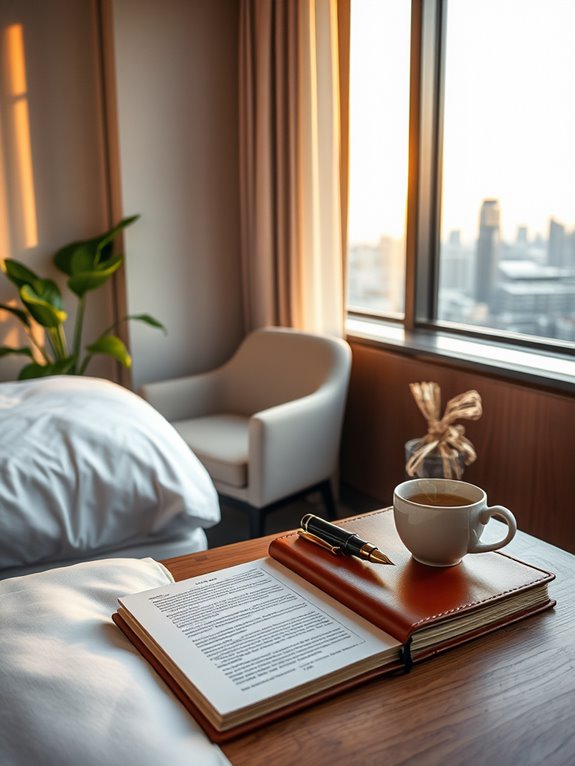
Journaling can be a powerful tool to help you clear your mind before bed, allowing you to release the day's thoughts and worries.
By jotting down your travel reflections, you not only process your experiences but also enhance your creativity and problem-solving skills.
Journaling your travel reflections boosts creativity and sharpens problem-solving skills, enriching your experiences on the road.
The journaling benefits are numerous; it helps you to articulate your feelings, making it easier to let go of stress. Engaging in this practice can help you develop emotional balance, which is essential for managing daily pressures.
Consider setting aside just a few minutes each night to write. You might list highlights from your day, express gratitude, or explore any anxieties.
This practice creates a calming ritual, promoting relaxation and clarity.
With every entry, you'll find your mind becomes quieter, making it easier to drift into restful sleep, even while on the road. Additionally, engaging in mindfulness exercises through writing can ground you in the present, contributing to improved well-being.
Frequently Asked Questions
How Can Travel Anxiety Affect My Sleep Quality?
Travel anxiety can greatly impact your sleep quality.
When you experience travel stress, your mind races with worries, leading to sleep disruptions. You might find it hard to settle down as thoughts about itineraries or unfamiliar environments swirl. This heightened state of alertness keeps you from fully relaxing.
To combat this, try implementing calming routines or mindfulness techniques that help quiet your mind, allowing for a more restful night's sleep during your travels.
What Are the Best Travel-Friendly Meditation Apps?
Isn't it ironic how the hustle of travel can leave you craving peace?
For those chaotic moments, travel-friendly meditation apps are a game changer. Try Headspace or Calm; they offer mindfulness exercises and guided meditations perfect for your on-the-go lifestyle.
With calming sounds and easy-to-follow sessions, you'll find serenity wherever you are.
Embrace the innovation of technology to enhance your travel experience and restore your inner calm amidst the whirlwind of adventure.
Should I Take Sleep Aids While Traveling?
When considering sleep aids while traveling, it's important to weigh your options.
You've got various sleep aid options, from over-the-counter medications to natural alternatives like melatonin or herbal teas.
If you prefer a holistic approach, try deep breathing exercises or a calming bedtime routine instead. These methods can enhance your sleep quality without the potential side effects of pharmaceuticals.
Ultimately, choose what feels right for you, ensuring restful nights away from home.
How to Deal With Noisy Hotel Environments?
Imagine drifting into a serene dreamland, but the raucous sounds of hotel life wrestle you back to reality.
You can reclaim your peace by using noise-canceling headphones, which wrap you in a cocoon of calm, or a white noise machine that transforms chaos into a soothing symphony.
These tools turn your environment into a tranquil oasis, allowing you to unwind and embrace restful sleep, even amidst the bustling backdrop of travel.
Can Essential Oils Help Me Sleep Better While Traveling?
Essential oils can definitely help you sleep better while traveling. Their aromatherapy benefits create a calming atmosphere, making it easier to unwind.
Blends like lavender and chamomile promote relaxation, while eucalyptus can clear your mind. Simply add a few drops to a diffuser or a cotton ball beside your pillow.
You'll find that these soothing scents transform your travel experience, allowing you to drift off peacefully despite your surroundings.
Conclusion
As you drift into sleep, think of your mind as a calm lake, undisturbed by the day's ripples. By establishing a soothing bedtime routine, practicing mindfulness, and creating a cozy sleep environment, you can gently quiet your thoughts. Limit screen time, embrace relaxation techniques, and consider journaling to ease your mind. With these simple steps, you'll find it easier to embrace restful nights, even while traveling. Sweet dreams await you—just like the stars that light up the night sky.

